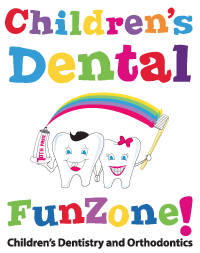Comprehensive Pediatric Dental and Orthodontic Care
Why Choose Children's Dental FunZone?
Choosing a dental clinic for your child is a big decision, and at Children's Dental FunZone, we make it easy. With over 23 years of experience in pediatric and orthodontic care, your child is in good hands. Our FREE consultations, emergency hours, and flexible scheduling options ensure you get care when you need it. We handle insurance paperwork for you, and our welcoming atmosphere makes dental visits enjoyable. Plus, with online booking and a referral program offering special bonuses, we make dental care convenient and rewarding.
Children's Dental FunZone is also a proud member of organizations like the American Academy of Pediatric Dentistry and the American Dental Association.
Book Now →
Preventative and Routine Care
Preventive care is the cornerstone of a healthy smile. At Children's Dental FunZone, we offer regular check-ups, cleanings, fluoride treatments, and sealants to keep cavities at bay. Our friendly staff educates kids and parents alike on proper brushing and flossing techniques, making dental hygiene a fun part of daily routines. By catching issues early, we help avoid more complex treatments down the road.
Learn More →
Restorative Dental Treatments
Sometimes, even the best brushing habits need a little help. Our restorative treatments include fillings, crowns, implants, and bridges to repair and protect your child's teeth. Using the latest technology and materials, we ensure each procedure is as comfortable and effective as possible. We focus on minimally invasive treatments to preserve as much of the natural tooth as we can.
Learn More →
Braces and Aligners
Straightening teeth has never been easier or more discreet. We offer traditional braces and modern clear aligners to meet diverse needs and preferences. Our orthodontists work closely with each patient to monitor progress and make adjustments as needed, all while keeping comfort and aesthetics in mind. Say goodbye to crooked teeth and hello to a perfect smile, thanks to Children's Dental FunZone.
Learn More →
Orthodontic Planning & Consultation
Early orthodontic evaluations can set the stage for a lifetime of healthy teeth. Our orthodontic planning and consultations identify potential issues using X-rays and more to and create a roadmap for treatment. Whether it's braces or aligners, we provide clear guidance and support every step of the way, ensuring your child's smile grows beautifully.
Learn More →
Emergency and Special Care
Dental emergencies can be stressful, but we're here to help with same-day care and walk-in appointments. Whether it's a toothache, broken tooth, or any other urgent issue, our experienced team provides prompt, effective treatment to alleviate pain and restore oral health. Special care is also available for children with unique needs, ensuring everyone gets the attention they deserve.
Learn More →
Here's what our satisfied patients are saying...
At Children's Dental FunZone, we take pride in providing exceptional pediatric dental care to our patients. We would be grateful if you could share your thoughts about our dental practice with others. Your feedback helps us improve and helps others make informed decisions. Please take a moment to leave a review of Children's Dental FunZone and let others know what you think.



Share On: